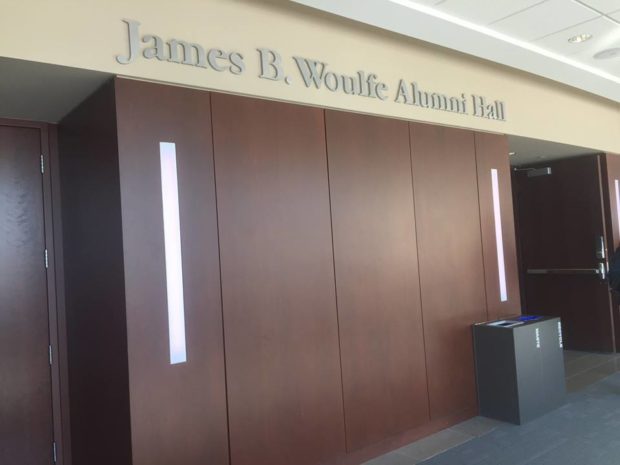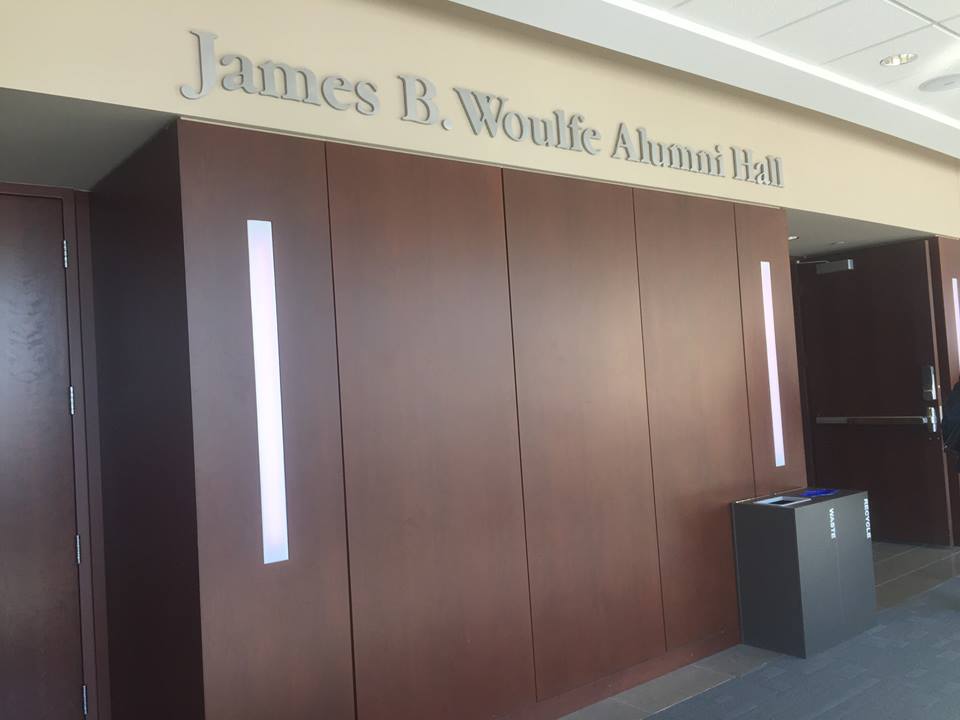
At least 50 students gathered in Woulfe Alumni Hall on March 13 for a healthy sex teach-in hosted by St. Thomas’ Feminist Community, which featured a panel of seven St. Thomas students from a variety of sexual identities who talked candidly about their experiences with sex and sexuality.
The event was the first of its kind on the St. Thomas campus. Senior Emma Kopp, who organized the event and is a member of FemCom, thinks that an open discussion on healthy sex is just what the university needs.
“I think that especially being from a Catholic university that prides itself in it Catholic identity — and there’s absolutely nothing wrong with that — but I think a lot of stuff gets neglected, specifically sex education,” Kopp said.
Senior Shannon Twiss, who is also a FemCom member and event organizer, echoed Kopp’s thoughts, and in no way wanted to go against the Catholic church.
“I don’t think we’re saying anything that would be disparaged of Catholic identity,” Twiss said. “There’s folks on the panel who would self-identify as Catholics.”
The topic of consent is a widely discussed issue on college campuses, but the organizers wanted to take the focus off of what consent is not and focus on the positives of having trust and consent in a relationship.
“We don’t spend a lot of time talking about what consent is, which when you start talking about what consent is, you’re really just talking about healthy, happy sex,” Twiss said.
“Talking about happy, consensual sex is a great way to eradicate sexual violence on campuses too,” Kopp added.
Event attendees could send in anonymous questions for the panel, and they spent over two hours delving into sensitive subjects from a wide range of topics, including sexual trauma, sexual identity, abstinence, healthy relationships and religion.
Event organizers asked faculty and staff not to attend the event due to the sensitivity of the subject matter.
“We just wanted to create a space that we can be comfortable in together as students, without this overwhelming feeling of authority or censorship,” Kopp said.
Junior Michael Antolak, who is an RA and active in FemCom, thought that this was an important event for students, so he recruited six of his residents to attend the event.
“I don’t think they would have come to this event had I not plugged it,” Antolak said. “I was just another voice to bring it to their attention, and I was really glad that all of them came because they were all willing to come and talk about it.”
Sophomore Ryan Zappa, who attended the event, sees the importance of sexual education on campus and was glad that students were able to open up about their experiences.
“It’s a good way for people to get clarity on a confusing subject,” Zappa said. “I think a lot of people are not willfully ignorant on it, but lack the resources to gain the knowledge … especially since there’s so many stigmas around the topic.”
Kopp hopes to host more events like this in the future, and is hopeful that they are taking a step toward a more open dialogue on campus.
“I hope that this event encourages the university itself to take more initiative on educating its students on healthy sex,” Kopp said. “It would be real nice to look back and see that we did have a hand on making this change, and our university is being more comprehensive on its education for students.”
Mary Brickner can be reached bric0029@stthomas.edu.


>“I don’t think we’re saying anything that would be disparaged of Catholic identity,” Twiss said.
Promotion of casual sex on campus, even if consensual, degrades Catholic identity.
>“There’s folks on the panel who would self-identify as Catholics.”
Doesn’t mean they’re good Catholics.
Paul, there was no “promotion” of sex in this panel nor is than any in this article. Just because UST is a catholic school doesn’t mean there can’t be inclusive education about sex and sexual health. Students are having sex, catholic and non catholic students, therefore there should be education on it that isn’t censored by catholic teaching. The whole “don’t teach sex and people won’t have sex” doesn’t work. People are going to have sex regardless of religion. Not everyone who goes to UST is catholic and I’m really glad there are more areas for non catholic students to get education on sex, sexuality, and other censored topics. I am so proud of these people for their intelligence and their openness.
>Just because UST is a catholic school doesn’t mean there can’t be inclusive education about sex and sexual health.
The education should not be anything contrary to the teachings of the Church.
>Students are having sex, catholic and non catholic students, therefore there should be education on it that isn’t censored by catholic teaching.
According to Catholic Canon Law, teachers who teach disciplines relating to faith or morals at a Catholic university need to take an oath of fidelity to the teachings of the Catholic Church. Nothing taught at a Catholic University should contradict Catholic teaching. There can surely be debate on things which are controversial or not settled, but there should be absolutely no promotion of anything directly antithetical to the teachings of the Church. Students who go here know that it’s a Catholic university. They shouldn’t expect nor ask for anything contrary to the Catholic intellectual tradition upon which the university is founded.
> I am so proud of these people for their intelligence and their openness.
I really don’t appreciate the subtle jab at the intelligence of people opposed to the event.
Hi Paul! Thanks for your honesty and your thoughts!
I was an organizer and would like to clarify a few details:
First and foremost that the University did not “allow” this to happen. As organizers, we did not ask for permission and this event was not sponsored by the university. It was put on by a group of autonomous students. FemCom (Short for “Feminist Community”) is a group of students that is not recognized by the university. FemCom is a diverse group of students (many of whom are “good” catholics and by your implied definition, celibate) that embrace differences and promote healthy, multifaceted dialogue on campus and in the broader community.
Second, I’d like to assert that this panel did not pressure students to engage in sexual activity. It was simply an event for audience members to ask questions to their peers in a space free of judgement. I would hope that as a fellow Catholic, you would agree that even within marriage, sex should be safe (not as in contraception, but in this case I mean specifically: consensual, with someone we care deeply for, that does not put us in danger).
Last, I am concerned with your judgement of those who are Catholic but by your expectations “not good Catholics.” There was no active promotion of premarital sex on campus at this event. I am proud to have been this panel with Shannon and other Catholic folks who believe in the nuance of identity.
You are welcome to e-mail me for any further clarification at…